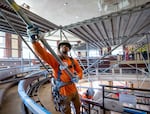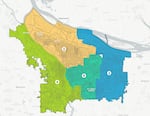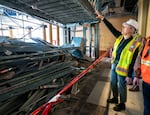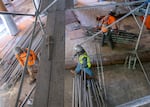Portland is months away from a historic change to both its election system and entire form of government. As campaign signs begin to crowd residential streets and the city starts holding ballot counting trial runs, it’s time to dig into the details of the significant changes on Portland’s horizon. Here’s what Portlanders need to know about the coming changes.

FILE: Portland city commissioners consider an ordinance on April 12, 2023. Mayor Ted Wheeler is seated at center. The city's mayor will no longer sit on City Council or vote on council items once changes take effect in January 2025.
Kristian Foden-Vencil / OPB
Let’s start with the basics: What exactly is changing?
A lot. The size of Portland City Council, the city’s form of government and the way Portlanders vote will all change.
In November, Portlanders will use a method of voting called ranked choice to elect 12 new city councilors, a new mayor, and the city auditor. The 12 councilors — an increase from the current body of five commissioners, including the mayor — will be elected by geographic district. (Commissioners were previously elected citywide.) Portland’s four new districts will each have three representatives on council.
This new governance body will start work in January under a new government format. Under this “mayor-council” model, city councilors will focus solely on legislating and will no longer oversee city bureaus. These departments will instead be overseen by a new city administrator, who will report to the mayor.
How did we get here?
For more than 100 years, the city has run under a “commission” form of government, where council members act as bureau administrators as well as legislators — and are elected citywide. Voters have rejected changes to this style of government no less than seven times since 1913. That changed in 2022.
Every 10 years, Portland City Council appoints a 20-person commission to review the city charter — which is a document akin to a constitution that establishes how the local government operates. This commission met in 2020 to determine any tweaks to the charter. Their recommendations — introduce district representation with a larger council, adopt ranked choice voting, and change the form of government to “mayor-council” — were all driven by the shared interest to increase diversity on the City Council and reflect the needs of constituents across the entire city.
The commission’s package of recommendations went to the November 2022 ballot, and was approved with 57% of the vote.
Shortly after Election Day, the city established a new charter transition department focused on making sure the city met the voted-upon plan to have these changes in place by January 2025. Transition staff have spent the past 19 months tackling numerous critical topics, which include overseeing renovations to City Hall to fit the newly expanded council, establishing a new city management structure, and supervising volunteer work to draw the four new district boundaries and set salaries for the new elected officials.
How will this transition change the mayor’s role in City Hall?
The mayor will no longer sit on City Council or vote on council items (except to break a tie). Instead, the mayor will work closely with the city administrator to carry out policies approved by council — and craft the annual budget.
For Tate White, a member of the city’s government transition team, a metaphor is the best way to explain the mayor’s new job.
“So in the mayor-council form of government, the mayor is the chief executive, the CEO,” White said. “Many companies have boards that are making legislative-like decisions — that’s the City Council — and then the CEO is expected to execute on those decisions.”
White said the mayor will serve more as a figurehead than a legislator.
“They’re going to be partnering with other jurisdictions, they’ll be standing at press conferences, they’re going to be the people meeting with representatives from sister cities when they come and visit, it will be far more ceremonial,” she said.
The mayor will also be tasked with appointing a city administrator, city attorney, and police chief — with City Council’s approval.

FILE: Syhean Osby of Northwest Scaffold Service Inc. erects scaffolding in the council chambers on May 15, 2024. Construction was underway at Portland City Hall to accommodate the expanded 12-person council, as approved by voters in 2022.
Kristyna Wentz-Graff / OPB
What will the city administrator do?
The city administrator will oversee the day-to-day operations of all city departments.
If the mayor is a more public-facing figurehead, the city administrator will be looking inward. They will be meeting with bureau directors and staff and helping troubleshoot any problems — and will be responsible for hiring, firing or disciplining bureaus leaders.
They won’t be working alone. The administrator will have an assistant city administrator and six deputy city administrators working beneath them, each assigned to oversee a cluster of similar city offices. The current City Council has already hired people to fill these positions, so they can hit the ground running before January.
The city administrator will also be a more regular attendee than the mayor at City Council meetings, where they will serve as a resource for bureau-related questions.
OK, so what is the role of City Council under this new form of government?
The 12 City Council members will act as legislators — not unlike state or congressional representatives — tasked with proposing new policies and representing the interests of people living in their district. They will no longer be responsible for overseeing any bureaus, which has been a key role of council members under the outgoing government structure.
Members of City Council will no longer be referred to as commissioners. They will be councilors.
Due to budget limitations, Portland is only offering the new councilors one staffer (currently, commissioners have between six and seven staff each). What that employee focuses on — community engagement, policymaking, office operations — will be up to the councilor to decide.
Will the new City Council be voting on the same kinds of decisions as before?
Not entirely. Council will continue to vote on new legislation, approve the city budget, oversee real estate deals involving the city, levy taxes, pass bonds and refer ballot measures to voters, among other things.
Yet councilors will no longer discuss legal settlements that cost the city less than $50,000 or approve new contracts or most grant applications. These decisions will be made by the city administrator.
Diana Shiplet, another member of the city transition office, said this reflects the voters’ request to remove councilors from their bureaucratic roles.
She said City Council members will still have the opportunity to guide these financial decisions through their contribution to the city budget. They can also request that the city administrator’s office present regular financial reports and updates on specific programs
Will this change the way policy ideas come to council?
Yes. Currently, the mayor places legislative items on the council agenda. But without a mayor to preside over council meetings, this new body will need to elect a council president. If a council member wants to bring a policy idea to council, the council president must sign off first.
The president will then send that proposal to a council committee. This is also new: Along with attending council meetings, councilors will be expected to sit on committees with focus areas, similar to congressional committees.
The idea is that these committees, made up of up to seven councilors, will serve as the main venue for public testimony and council debate over policy ideas.
“Council committees are intended to be the place where council does the most work — not just work on policy, but engagement with the community,” said Shiplet, with the city’s transition team. “And then each of those committees will make a recommendation on either sending forward legislation or requesting more research to be done. Those then go to the full council afterwards.”
It’s not yet clear how many committees will exist, how frequently they will meet or what their topic areas will be — that decision is up to the incoming council. A volunteer advisory group overseeing the transition has proposed a few ideas, like having committees focused on housing, transportation and public safety.
There are other ways to get legislation before the City Council.
While no longer a member of council, the mayor is permitted to submit policy proposals to council for consideration. If a bureau needs council to consider a policy change, it will also go through the mayor’s office. The city auditor is also allowed to place items on the council agenda.
What else does the council president do?
In many ways, this person will serve as the face of all council decisions and be expected to speak on behalf of the entire council in public.
But this new leadership role introduces room for potential overlap with the mayor, as the mayor is also expected to represent the city and its policies.
“As the council makes their decision as a group, there’s going to be more discussion between the council president and the mayor about who’s going to be the face of that decision,” Shiplet said. “In many cases, it will be the council president speaking for the council, and in some cases when it is connected to the overall vision of the city, it’s probably the mayor who will be speaking, hopefully, in tandem with the council president on those decisions.”
This is a lot of change. Who will be responsible for making sure it’s going according to plan?
Right now, that’s the job of the city’s transition team. They are planning to hold onboarding meetings with incoming council members shortly after the November election and into the new year — for as long as it takes for them to get the hang of the new processes.
City Council will also have a new office dedicated to helping the new body run. The council operations team of at least five people will report directly to the council president and make sure the new council and committees are functioning. They’ll also be on hand to provide background and research on policies the council may be discussing.
So if I have a problem with something the city is in charge of, who do I contact?
In the outgoing form of government, where city commissioners oversee bureaus, commissioners have constituent services staff who have been expected to field these kinds of questions. With just one staff member, that’s not anticipated to be a councilors’ responsibility.
Instead, if a Portlander has a problem with a basic city service — maybe there’s a pothole that needs fixing, or your garbage wasn’t picked up, or a park light is broken — they will be advised to call 311. That city-run information line will connect callers to the right bureau to resolve a problem. The service will also patch callers through to councilors’ offices, if they want to comment on a legislative decision.

FILE: An map showing Portland's new council districts.
Courtesy of the City of Portland
We have to vote before any of this falls into place. What’s going to be different about the way we vote in November?
Portlanders will be using ranked choice voting. It’s arguably the most complicated update to the city’s new playbook.
Previously, voters elected people to city office by selecting just a single candidate. If a candidate collects more than 50% of votes in a primary election, they automatically win. If no candidate receives a majority in the primary, the top two candidates move on to the general election. The new voting system abolished primary elections for city offices, which usually occur in May, and condensed this elimination process into one election cycle — the November general election.
In November, Portlanders will be voting to elect a new mayor, auditor, and their three new district representatives on council. But instead of just casting one vote in each race, voters will be expected to rank candidates according to their preference. The idea is to increase the chance of voters electing someone they support, even if the winning candidate is not their top pick.
In the mayor and auditor races, voters will rank up to six candidates. In those races, a candidate automatically wins if more than 50% of voters select them as their first choice. If no candidate reaches this threshold, the candidate with the least number of votes is eliminated. Voters who chose the losing candidate as their top pick get their votes transferred to the candidate who was their second choice, and staff recalculate the results. If that doesn’t push a candidate over 50%, the cycle continues until someone crosses that threshold.
It’s slightly different in the council district races, where voters will be picking three candidates all at once. Like in the citywide races, voters will rank six candidates in order of preference. Any candidate who gets over 25% of the first-choice votes automatically wins a council seat. If only one or two candidates pass that threshold, the candidate with the least amount of first-choice votes is kicked out of the race. Voters who picked this eliminated candidate as their first choice get their vote transferred to their second-choice candidate. Similarly, voters whose first-choice candidate won over 25% get a fraction of their vote redistributed to their second choice. This process continues until three candidates pass the 25% threshold.
Still following? If this process is hard to wrap your head around, you’re not alone. Visual learners might appreciate this helpful video made by civic engagement nonprofit Rose City Reform that breaks down the new election process with puppets.

How does ranked-choice voting work? This visual explainer walks through the steps of the ranked-choice voting process.
Kati Perry / AP
Will my ballot look different?
A little. The ranked choice ballot will have bubbles to fill out next to each candidate’s name and columns to rank them. It’s pretty straightforward: Here are some examples. While each race will likely have more than six candidates, voters will only be allowed to rank six.
Portland voters will also receive two ballots in the mail this year: One for ranked-choice voting, and the other for county, state and national elections, which won’t be using ranked-choice.
Will this new process mean it will take longer to learn who wins in November?
Not necessarily.
On Election Night the first round of results will come in at 8 p.m., as they have in the past. Because not all ballots will be in at that point, due to a rule allowing mail-in ballots to be mailed on Election Day, it may not be immediately clear who is in the lead after the initial round.
Multnomah County oversees city elections. In the past, the office has posted updated ballot counts every few hours on election night. Under this new model, the county elections office will wait 24 hours after the first announcement before updating results — those will come in on Thursday, Nov. 6. That delay is to ensure accuracy in the brand-new system.
In the meantime, the elections department is working hard to fine-tune the new system and new ballot-counting technology to ensure it runs smoothly and swiftly in November. They’re planning for all scenarios. Leah Benson is the ranked choice voting project manager at Multnomah County. She said the office has been conducting trial runs of the ballot counting system, and they even plan on practicing hand-counting ranked choice ballots later this summer to ensure votes can be counted in the case of a technology meltdown
“It’s great to rely on computers, but it’s nice to prove that it’s something that we can do by hand, too,” Benson said.
What still needs to be figured out?
Not much. The city transition team is primarily focused on trying to explain all of this to voters in the coming months.
There is more opportunity for the public to shape this new process. Portlanders can give input online on how the council should operate under the new system or give feedback during an Aug. 1 listening session.
Above all, White wants to ensure that Portlanders expectations are realistic as they head into a brand-new chapter of government.
“It’s such a huge change. We are doing significant work to prepare and are really hoping for the best, but I hope everyone knows that it’s going to be paced out,” White said. “I think if I had a message for everyone, it’s just like, ‘We’ve got this. Just don’t get frustrated on day one when it doesn’t seem absolutely perfect.’”
Editor’s note: This story may be updated as more details about the new form of government are finalized.


















